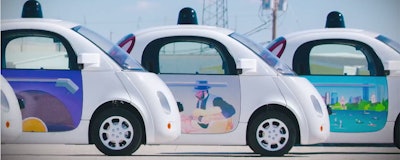
 Michael O’Shea
Michael O’SheaCar ownership is a vital part of our culture. At its simplest form, cars get you from point A to point B, but over time they become treasured keepsakes that tell the stories of our lives and remind us of our favorite memories, milestones and experiences. Despite the continued importance of car ownership in a modern society, the relationship between humans and vehicles is in transition. Several technological and cultural factors are driving this change and, in time, these factors will converge in a way that could threaten the entire notion of car ownership as we define it today.
The development of automotive technology is paving the path for a world where transportation stretches far beyond owning a car. Picture a shared economy where ride sharing services and autonomous, connected cars merge to dominate the automotive industry, creating a tipping point where car ownership is no longer necessary.
Ride-Sharing: Share and Share Alike
Ride sharing services have experienced a meteoric rise around the world over the past several years, and it’s safe to say the trend will only continue to increase in scope and scale. Uber alone has given over 5 billion rides to more than 50 million users across 78 countries, while Lyft and host of other emerging companies are nipping at the company’s heels.
If someone uses a ride-sharing service now and again, that does not necessarily mean they’re likely to give up their car. Car ownership numbers have held strong—it is the taxi industry that has really suffered. Nevertheless, a study from UC Berkeley Transportation Sustainability Research Center shows that mobility service Car2Go is beginning to influence car-buying decisions in specific urban centers. In addition to the rise in ride-sharing services, other alternatives, like the recently announced Care by Volvo car subscription service, have started to spook the industry a bit.
Automakers have long feared that younger generations will be less likely to purchase cars, and even if recent data doesn’t point to an impending dramatic shift, they have access to more transportation options than ever before. While ride-sharing alone may not pose a serious or immediate risk to the financial security of the automotive industry, it is an important piece of the changing transportation landscape. As these services advance, more companies are introducing technologies to enhance the passenger experience, opening the door to a world where alternatives to car ownership are more convenient and cost-effective.
Autonomous Vehicles: One Car, Multiple Owners
Practically every major car manufacturer in the world is in partnership with Silicon Valley’s finest to develop self-driving technology, and automakers like Ford, GM and Nissan have already logged thousands of miles in real-world road tests. At this point it is a question of when, not if, we will get to total autonomy—although popular opinion has been divided over the estimated timeline, given the current regulatory, political and technological barriers.
Regardless of when this transition will happen, autonomous vehicles could certainly presage a shift away from our current one car, one owner model. If a car doesn’t require a driver, it suddenly seems enormously inefficient to have it sitting unoccupied in a parking lot or driveway. Now combine autonomous cars with ride-sharing: Imagine being able to share a car or fleet of cars with multiple people while still feeling the sense of ownership. Once autonomous cars are adopted by the mainstream, it will become increasingly important to personalize the experience for each passenger, creating a unique, on-demand experience that mimics that of actual car ownership. In that scenario, who would want to own a car?
Smartphone Connectivity: My Phone, My Car, Myself
While an ownerless, driverless cartopia sounds too good to be true, there is something slightly cold and commodified about the idea on its own. Will people really be willing to trade in their beloved cars for a series of rides in anonymous vehicles? Perhaps not at first, but the key to the transition may ultimately lie in an even more ubiquitous and increasingly beloved piece of machinery—the smartphone.
An individual’s smartphone is a part of their identity. It holds precious photos, favorite music, sensitive data, and is a map of social and professional communication. Utilizing the smartphone to bring personalized experiences into the car can ultimately create a sense of ownership without having to actually own a car. With smartphone integration, we can create those memories and milestones within the cars of the future.
Some infotainment systems are already equipped to give drivers the ability to enjoy all their favorite apps and media in the car by simply connecting to Wi-Fi or a USB. That same technology can be used to set and control preferences for climate control, seat and mirror adjustments, music selections and more. Smart devices could serve as the personalization engine for the shared, driverless car of the future, allowing each rider to immediately make the vehicle their own. People feel the same sense of ownership and personalization for their smartphones as they do for their cars and that sense of connection can help ease the transition to a new model of personal transportation.
As humans transition from driver to passenger, their mode of transportation might consist of hailing a self-driving car on-demand, and if they do decide to continue the trend of car ownership, more and more will likely opt to share their vehicle with others while it’s not in use. Car ownership is deeply embedded in our culture, and people are not going to suddenly stop purchasing vehicles overnight. The emergence of game-changing developments like ride-sharing and autonomous driving along with the rise of personalized smartphone solutions have the potential to create an experience that competes with the cult of car ownership. This, along with emerging automotive technologies, like Amazon’s Alexa and in-car ecommerce platforms, are laying the foundation to shake up the car industry in the near future.
Michael O’Shea is CEO at Abalta Technologies.























